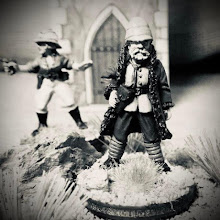Here is a great character for In Her Majesty's Name, The Men Who Would be Kings (Paid Link), or other popular Colonial, Victorian Sci Fi or Pulp games.
Sartōr Faqīr (Pashto: سرتور فقير; died 1917), also known as "Mullah Mastan or Mullah Mastana", Pipi Faqir or Saidullah in Pashto and by the British as "The Great Fakir" or "Mad Faqir", "Mad Faqir of Swat" or the "Mad Mullah", was a Pashtun tribal Yusufzai leader and fighter. His name Mullah Mastan translates to "God-intoxicated" as a reference to his religious convictions and his belief that he was capable of miraculous powers and challenging the British Empire.
Sartor Faqir was born as Saidullah Khan in the village of Rega Buner in the Buner Valley and was a member of a branch of the Yousafzai tribe. In order to further his religious education, he lived and travelled throughout India and Central Asia, before setting in Mazar-i-Sharif in Afghanistan for a period of ten years. In 1895, he returned to Buner.
In response to the British occupation of the North West Frontier Province of modern-day Pakistan, and the division of Pashtun lands by the Durand Line, the Faqir declared a jihad against the British Empire, unsuccessfully in 1895,then successfully in 1897. In late July, he led from 10,000 to 100,000 Pashtun tribesmen in an uprising that culminated in the siege of Malakand, which ended with the British being relieved on August 2.
Although the Faqir continued to lead further attacks against the British, the siege of Malakand marked the height of his power and influence, which declined as the British made agreements with other local tribes and rulers to counter him. The Faqir eventually made his own agreements with the British government, with the revelation of an exchange of presents and correspondence with the British political officer of Malakand leading to accusations of the Faqir being in the pay of the British government. This and the Faqir's advancing years led to a further decline of his movement, which broke up upon his death in 1917.
This was a fun figure conversion. As I am building forces for the NW Frontier uprising of 1897 - 1898, I just had to include the Mad Mullah as a character (in fact there appears to be 2 or 3 identified during this conflict!). I started with the Imam figure from Brigade Games, and in a moment of extreme dexterity (I only stabbed myself once) I cut off his arms.
I added the hard plastic arms that were drawing a tulwar from a scabbard from the Perry Miniatures Afghan Tribal Infantry (Paid Link) box which once again confirmed to me the value of hard plastic miniatures for conversions. I did some repainting and ta - dah; the Mad Mullah.
I will be publishing some suggested rules and character profiles for the "Mad Mullah" for both In Her Majesty's Name and The Men Who Would be Kings (Paid Link).












Great stuff Neil...the appellation "Mad Mullah" seems to have been applied more than once to indigenous opponents of the Empire....and why not ? They MUST have been mad, not to appreciate the benefits of being ruled by the British....??!
ReplyDeleteWhat amazes me during the Uprising of 1897 to 1898 was how many of the tribesmen were in the British Indian Army and remained true to their salt in fighting their tribes. I'm glad we now spend time on Cultural Awareness.
DeleteVery nice conversion work and painting!
ReplyDeleteThanks! It was literally and "why not" moment!
DeleteNeil
Great colors on this fella’s wardrobe.
ReplyDeleteI figured if you are going to start an uprising and raise the tribes, you had better look the part.
DeleteNeil
Colorful and superb uniforms, cracking job!
ReplyDeleteThanks Phil. My Pashtun force is slowly but surely coming along.
DeleteNeil